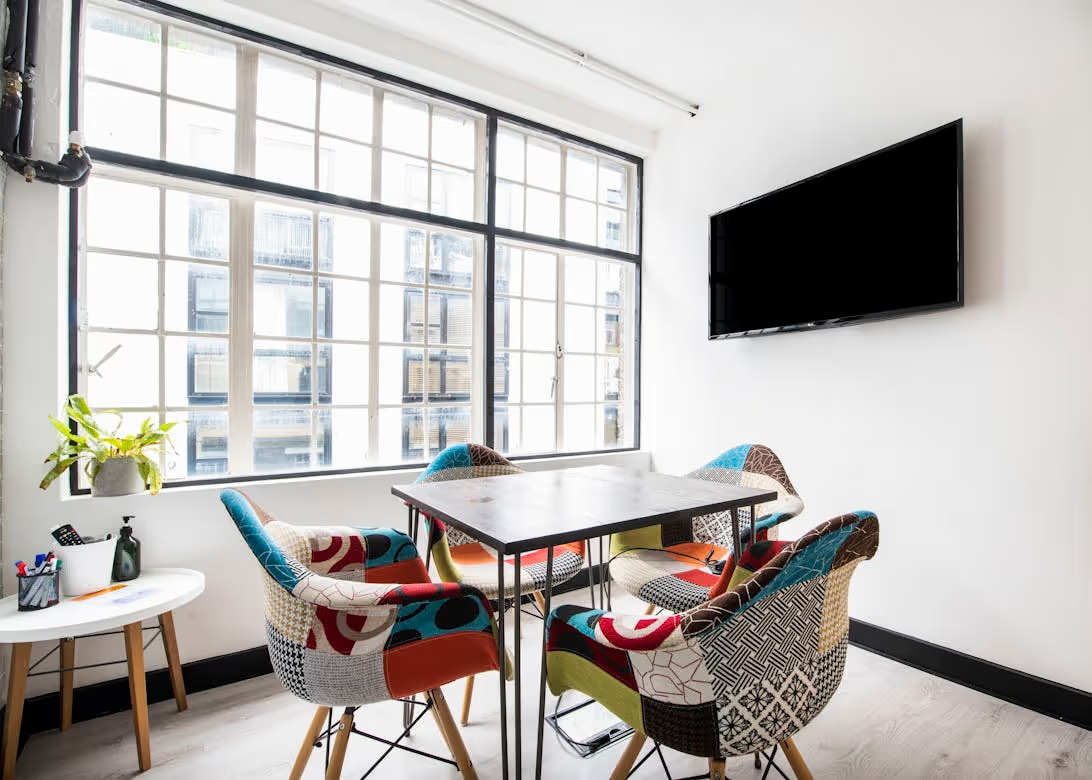Checklist for Moving Offices

So you've decided it's time - a fresh start in a new office. Away from those horrible stained carpets, that weird smell in the fridge that nobody has bothered to clean and the useless air conditioning that has one desk roasting while everyone else works in their coats. An office move for not just where your company is today, but for where you are heading.
We get it though, moving your business to new premises can seem like a daunting prospect. It doesn't have to be a stressful life event, though, like moving home might be. You see, we help people move into a new space all the time - it's what we do. So, to ensure that your office relocation is a positive experience, create an office relocation checklist based on the information below and your new office space will be up and running in no time.
Get organised
While I know that you would much rather be browsing the internet to pick out your new office chair or sorting out the seating plan, there are a few very important things you need to put into place before you get to the fun bits. Like any other project, your office move project will need careful planning if you are going to make everything run smoothly - create an office move checklist. Ideally, you should start planning 3-6 months before your ideal moving date.
What are your terms on your current commercial lease?
(The fun bits are coming, I promise) In order to plan your moving date, you will need to know exactly when your current lease expires and what the terms are - have a read of this government site if you are ending the lease early. You will want to avoid any charges that may result in you losing your deposit, so check for what you are liable for within the office space and make sure it is all accounted for. If you are in any doubt, you should consider seeking legal advice to avoid being hit with avoidable fees.
Assemble a planning team
Moving your office to a new location can be a big job, and as such you shouldn't aim to do it alone. Put together a planning team, and start to delegate jobs to people. Think about what you will need from different people throughout the planning process - depending on the logistics of your office move, you may require people that are physically capable of assisting. Finally that guy that dashes off to the gym every evening will come in handy...
Will you be taking the role of project manager? If not, you will need to work out who will.
Plan your moving budget
I'm going to assume that if you are reading a blog entitled 'Checklist for moving offices' that you already have made your decision on your new office location, and know all about rent, deposit and other such costs. What you will also need to keep in mind, though, is how much you have to spend on the move itself. There are plenty of little fees and charges that may crop up:
- Moving company: get quotes from a few different moving companies before you make your choice. Find out exactly what each one offers, and how much you will be expected to do. How much assistance you will need will all depend on the size of your company, and the amount of equipment you have.
- Storage: You may have to stagger your move, and therefore need to store equipment elsewhere.
- Refurbishments: Will a quick touch up of your old office save you from losing your deposit? Does your new office need work to give it that unique look that you're going for?
- Utilities: Is there a charge for changing location? If you are swapping suppliers are there any cancellation/setup fees? What about internet connection and phone lines? Will that be provided in your new space?
- Post redirection service: Royal Mail provide a change of address service that redirects your post
- Insurance: You'll likely have a lot of expensive equipment, so it may be an idea to take out moving insurance in case anything gets damaged during the move.
It is important to know what money is available to you to help with the moving process, so that you can make informed decisions on the above. Get together with the other planning team members and thrash out a detailed moving budget.
Create your office move timeline
Once you have your budget sorted, it's time to agree on the key dates for your office relocation project. This is where it all starts to come together, and where you can work to avoid stressful situations. Give yourself plenty of time to get things done, and remember to plan for worst case scenarios. If everything could fall apart due to an unreliable removals company or cleaning company, then think about what back up plans you can put in place. Here are some things to consider:
Office furniture:
Compile a complete office inventory. From this you will be able to work out what new furniture you will need, and then you can work out what order you want to start moving everything else. Will you need to keep your current office operational during the move? If the move is staggered, plan on which of your team members will be working from where, and what they will need, to keep two office spaces running at the same time.
If you need a lot of new furniture, when do you need it to be delivered, and what are you going to do with your old office furniture that you no longer need? If it is being collected by a removals company, make sure nobody needs it during the moving process.
Will you require storage while you wait to move into the new office space ? if so, what will need to be stored, how long for and when might you need access to it?
You may have been lucky enough to find a new office that comes fully furnished and serviced, in which case you will have to decide what to do with the old furniture.
Work with the IT department - they will be able to advise you on what pieces of technical equipment needs to be moved where and when.
Choose your moving company:
When planning your timeline, give yourself plenty of time here. This is one of the most important decisions when it comes to moving offices. Depending on the scale of your business, you may be tempted to move yourself. Our advice is - don't even think about it. It will be much more difficult than you imagine. Moving offices is stressful enough without trying to convince Maureen from accounts to give you a hand carrying the photocopier down the stairs...
Cost is important here, but so is reliability. Speak to them to find out exactly what they offer (do they help with the packing/provide packing materials?). Are they office moving specialists, and do they have references? Do they have availability for your preferred moving day?
New office floor plan:
It is never too early to think about where everything will go when you are moving office. Don't fall into the trap of leaving it too late, as a detailed floor plan will inform so much of your timeline and your general office relocation plan.
Obviously it is important because you will want to make the most of that new office space, but from a logistical point of view, deciding on your new office layout will decide:
- What office equipment and furniture will need replacing
- The order that everything needs to be taken out of the current office, and then put into the new office
- Whether you will need to arrange storage for any equipment that you won't need straight away in your new layout
Try colour coordinating each department and giving every employee a number so you get a clear idea of who is going where, and speak to a staff member from each department to get a good idea of their requirements and their ideal setup. This is a chance to get your new premises setup exactly how you need it to get the entire team working as efficiently as possible.
Contractors:
An office move is complex, and you'll be relying on countless external partners throughout the process. Other than the removals company, you will need to speak to every other company to get an idea when you need to action various tasks. These include:
- Cleaners: if you require cleaning services in your current office, find out when they can come in and how long they will need to complete the work. Ensure they get it done before you need to be off the premises
- Office design company: are you sprucing up the new office space? If so, find out when the design company can fit you in, and coordinate that with the office move. Will your office providers help you customise your space?
- Utility companies: there would be nothing worse than moving into The Ultimate Office, only to discover you will need to wait three weeks to be connected to the internet. Make sure everything will be turned on in time for moving day.
- Property Manager: speak to people at your new location and find out what date you can start moving in and what time. Do they offer fully serviced offices, and if so, what exactly is included? Ask for a walk through of the new office premises to familiarise yourself. Do you need to book a loading bay for moving day?
- Other suppliers: Do you need packing boxes? A change of address service? Security? Communicate with everyone involved with your office move and identify a clear timeline with them all.
Communication
You know your new location, you've settled on your moving date and you have a clear timeline on how to make everything run smoothly. Now you need to tell everyone.
Clients
Naturally, you will want to make sure that your clients have the most up-to-date contact details for your company, but make sure you make the most out of this opportunity. You have a legitimate reason to get in touch with clients that you haven't heard from in a while - use this as a way to remind them of what you do and why you are so great at it. Use your brand new, beautiful, fully serviced office to show off a little bit - whatever the reason for the move. Let this office move work for you in every sense.
Suppliers
Depending on what is provided in your new offices and its location, you may find that some key suppliers and local partners are no longer required, but you will need to tell any that you are carrying over that you are moving office and what your new address is. There may be more than you might first think - internet and telephone providers, stationery suppliers, water cooler refills, banks or other financial institutions, food and vending providers, insurance companies, service companies for photocopiers etc, professional institutions that you are part of. Work with your accounts team to ensure you catch everyone.
Staff
Obviously your staff will be aware that the move will be happening, but in order to prevent yourself from being inundated with thousands of questions, take control by keeping everyone - from board members to temps - in the loop about the upcoming move. Be sure to let them know:
- What you need from them and when - even if it is nothing, make it clear what is expected of them. Are they responsible for moving their personal belongings?
- Key dates - specifically when their team is office moving and how business operations will continue while the office moves.
- Important information about move - new office location, parking/public transport arrangements, what essential facilities they can expect there, details about security passes.
Others
Be sure to keep your current landlord aware of your plans to avoid misunderstandings - you may well need their help on moving day, so keep them sweet. Make sure your website and social media is updated with your change of address, as well as any business cards or stationary.
Practical preparation
Now it's time for you and your moving team to really come to life. Start working through your office move checklist. Have you got enough cardboard boxes? Is all the furniture accessible for the moving company? Is all the paperwork signed? Is the IT department happy...? Do you have enough team members to help you, or are you going to have to rope in a few more people? In your budget, make sure you allow for refreshments for any kind souls that give up their time to help everything go smoothly.
Take photos of your old office - make sure you have evidence of the condition that it was left in in case any issues arise with the landlord.
If you have followed the advice above you will already know what needs to be done and when, it is just a case of working through it methodically. Use your timeline, use the detailed floor plan of your new office, take a deep breath and the relocation process will go smoothly.
Make sure you and your team are on hand throughout the physical act of moving so that you deal with any minor hiccups along the way - with thorough preparation, and a well planned office moving checklist, you will be able to easily cope with anything that is thrown at you.
Getting settled in your new office
Now, you can breathe out.
Your new, perfect office is ready and you can get on with business. Make sure you reward everyone who has helped you, and if your budget allows, a little welcome pack for every member of staff always goes down well. Keep in mind that people often don't like change, and there will always be people that grumble (I suspect you already know who this will be...). Any little touches that you can afford will help keep them on side, and help to get everyone settled as quickly as possible.
Moving companies can be a stressful job, but it doesn't have to be. Get organised, surround yourself with a good team and keep our office moving checklist below in mind - you'll be fine.

Give us a go!
Don't choose another average space for your team. Get one that makes you happy.
The Checklist
Every office move will be slightly different, but we have prepared an outline of a checklist below. Use this, and add in all of the extra tasks that will be specific to your move to stay on top of everything, and keep the entire move as hassle free as possible.
Get organised (12-6 months from moving day)
- Assemble a planning team
- Work through current lease
- Set a budget
- Set a timeline
- Speak to removal companies
- Organise your utilities
Tell the world (6-1 month before moving day)
- Update your client list
- Keep the staff in the loop
- Tell the Royal Mail that you are moving
- Update social media, website, email signatures etc
- Tell your current landlord, keep them updated
- Inform: clients 𞠡 customers 𞠡 suppliers 𞠡 industry bodies 𞠡
Get moving (1 month out - moving day)
- Create your new office floor plan
- Audit your furniture to work out which bits need to be taken and when
- Arrange storage
- Finalise paperwork
- Walk through of the new office
- Book loading bays
- Collaborate with IT to ensure they will have everything they need
FAQ’s
Does a post redirection service cost money?
Yes. Royal Mail will charge you depending on how long you want the service. You can pay for up to 3 months, 6 months or a year. Check the Royal Mail website for the latest prices.
What perks can I expect from a new office?
This will obviously vary from office to office, but it is worth asking about before you sign up. At Runway East we offer perks such as; digital discounts on cool stuff, unlimited tea and coffee, super-fast WiFi, Friday drinks and Cake Wednesdays - all included in your contract.
What are the tax considerations when moving offices?
Possibly. As always, every company’s situation will be different, so it may be worth speaking to an expert. They will advise you on how to make the most of you Capital Allowances - don’t forget about the tax benefits of sustainable and ‘Green’ products.
Do I need an office design company?
Not necessarily. It will depend on the state of the office that you are moving into, and what your new hosts can provide. Some, like Runway East, will be able to work with you and use their own suppliers to create your perfect look.
Whatever your situation, we would recommend against trying to take this on yourselves - you are not professional designers, and it will be an incredibly difficult and stressful project to take on.
Got Questions? We've Got Answers
We've put together some FAQs to help you settle into life at Runway East.
find your
perfect space
Discover flexible workspace solutions across London, Bristol, Bath, Brighton, and Birmingham. From private offices to enterprise suites, find a space that grows with your team and keeps them happy every day.
.webp)


.png)
.avif)
.avif)